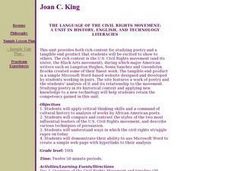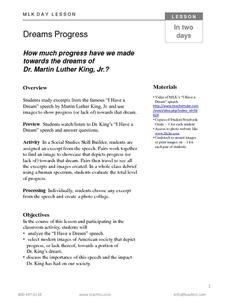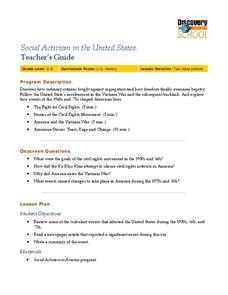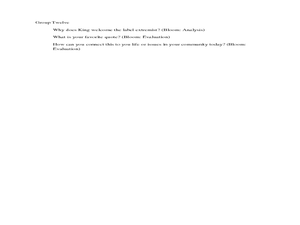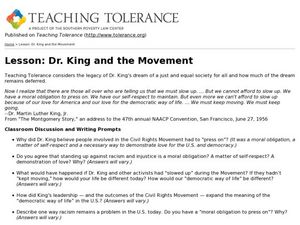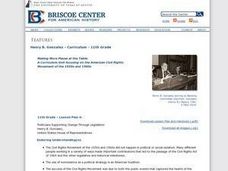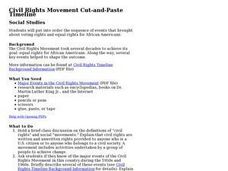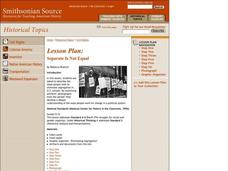Center for Civic Education
Citizenship Schools and Civic Education During the Civil Rights Movement and in the Present
Your young historians will discover the importance that citizenship education has played in the social progress of the United States as they learn about early efforts to discourage African Americans from voting in the 1960s.
Curated OER
Rosa Parks Changed the Rules
Students complete a diagram of the Montgomery bus that carried Rosa Parks into the history books. They read about Rosa Park's contributions to the Civil Rights movement. They role play Rosa Park's refusal to move to the back of the bus.
Curated OER
The Language of the Civil Rights Movement
Tenth graders develop a website documenting poetry integral during the civil rights movement in the United States. Working in pairs, 10th graders research the people and poetry of that was prevalent during the civil rights movement. ...
Curated OER
Cultural Impact of Jim Crow Laws and Civil Rights Movement
Students compare the cultural customs of people from European descent and African Americans between 1900 and 1940. Next students listen to interviews about life during the time of Jim Crow laws, and determine how life might be different...
Curated OER
The Language of the Civil Rights Movement:
Tenth graders study the poetry of the US Civil Rights movement and the Black Arts movement over a 12 day period. They author a website showing works of poetry that students have chosen to analyze and relate to these movements.
TCI
Dreams Progress
Has society progressed to the dream Martin Luther King Jr. expressed in his famous address during the civil rights movement? Learners work with a partner to analyze one excerpt from King's "I Have A Dream" speech and find a current image...
Curated OER
Social Activism in the United States
Seventh graders explore the goals of the Civil Rights Movement of the 1950s and 1960s. In this US History lesson plan, 7th graders read a newspaper article that reported a significant event during this era. Students write a summary of...
Curated OER
King Campaigns in Birmingham
Eleventh graders discuss the contributions of Reverend Martin Luther King, Jr. In this civil rights movement lesson, 11th graders read Rev. King's "Letter from Birmingham Jail", answer questions about the letter, share their answers...
Curated OER
Breaking Barriers
Determine how African-Americans have broken barriers in this history lesson. Middle schoolers discuss the 15th Amendment and the American civil rights movement prior to analyzing Barack Obama's speech "A More Perfect Union," taking care...
Curated OER
Dr. King and the Movement
Students complete activities about Dr. Martin Luther King's Civil Rights movements. In this Civil Rights instructional activity, students read a quote from Dr. King and discuss several questions about the topic and may use them as...
Curated OER
"The Story of Ruby Bridges"
Third graders examine the role of Ruby Bridges in the U.S. Civil Rights Movement. They listen to the teacher read the book "The Story of Ruby Bridges" by Robert Coles, identify what is fact or opinion in the story, and sequence events in...
Stanford University
Martin Luther King, Jr. and Malcolm X: A Common Solution?
Much has been made of the differences between Martin Luther King, Jr. and Malcolm X. But was there any common ground between them? Class members reconsider what they think they know about these two civil rights leaders with biographical...
Defining US
Integration of Education and American Society
How did the struggle for Civil Rights during the 1950s transform American society and politics? Why are American schools integrated today? Class members explore these essential questions by examining a series of primary and secondary...
Stanford University
Lesson Plan: Montgomery Bus Boycott
Most of us have heard of Rosa Parks, the Montgomery Bus Boycott, and Martin Luther King, Jr. But what about Claudette Colvin, Virginia Durr, Freedom Summer, or the Birmingham Children's Crusade? A five-lesson unit prompts class members...
Curated OER
Civil Rights Memorial
Students discuss the Civil Rights Movement and the key events that ended segregation in the United States.
Curated OER
Making More Places at the Table: The American Civil Rights Movement of the 50's and 60's
Eleventh graders examine the biography of Henry B. Gonzalez. They examine primary source documents from Congressman Gonzalez's personal papers related to his contributions to the Civil Rights Movement.
Center for Civic Education
The Power of Nonviolence: What Is Nonviolence? What Does It Cost?
Your young learners will delve into the language of primary source documents in order to identify the characteristics, benefits, and costs of nonviolence. The lesson plan includes a mix of activities, including an anticipatory activity,...
Curated OER
Civil Rights Movement Cut-and-Paste Timeline
Students put into order the sequence of events that brought about voting rights and equal rights for African Americans. The creative project can be made very crafty by having students cut out the timeline to be combined with others in a...
Stanford University
Observing Human Rights Day
How much intervention is appropriate for America to take in cases of human rights violations? Class members ponder a question that has lingered since the birth of America with a series of primary sources that reflect the degree to which...
Curated OER
Separate Is Not Equal
Based on discussion, analysis of primary source documents, and with the help of a graphic organizer, young historians discover the steps that were taken to eliminate segregation in public schools in the United States. This lesson from...
Curated OER
In the Courts
Students explore desegregation in the courts. In this civil rights lesson, students listen to their instructor present a lecture on Supreme Court cases Brown v. Board of Education and Plessy v. Ferguson. Students examine the cases and...
Curated OER
The Right to Remain Resilient
Students examine the Civil Rights Movements in the U.S., both current and historic. In small groups students investigate a specific civil rights group, create an illustrated timeline, noting key events, people, and state and federal laws.
Curated OER
Melba Pattillo and Ruby Bridges: Two Heroes of School Integration
Learners put themselves in the shoes of students who integrated Little Rock High School in 1957-58. Note: The primary resources in this activity provide powerful and poignant descriptions of what those students faced.
National Endowment for the Humanities
The Music of African American History
High schoolers examine role spirituals have played in African American history and religion, examine Harriet Tubman's use of spirituals in her work, explore power of spirituals in Civil Rights Movement, and work with oral tradition,...




